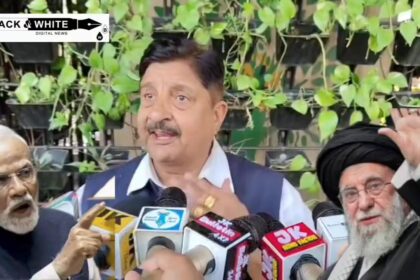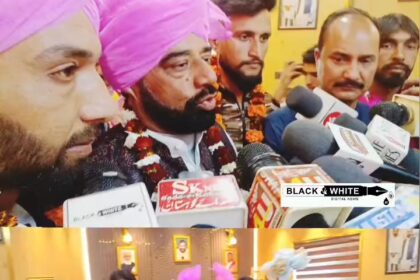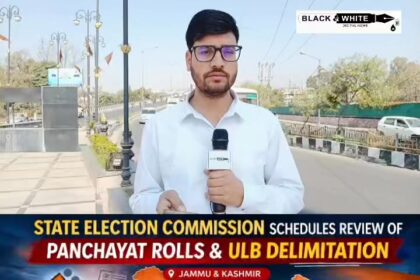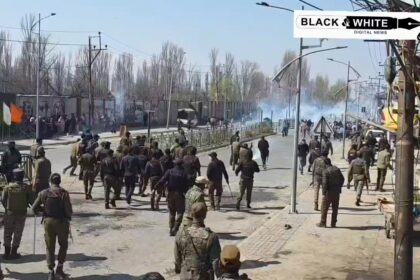May 04, 2024
||Black and White Digital News||
In a gripping twist of electoral dynamics, the Bharatiya Janata Party’s (BJP) ambitious foray into the Kashmir Valley has thrust Ravinder Raina, the party’s Jammu & Kashmir unit chief, into the spotlight as a key orchestrator of high-stakes campaigning in the region.
Despite not fielding candidates in the three Kashmir Lok Sabha seats, the BJP’s strategic maneuvers have dominated the political discourse, setting off a spirited debate over the party’s unprecedented inroads into the predominantly Muslim terrain.
Raina’s presence in the Valley, actively lending support and campaigning for the Apni Party and Sajad Lone, underscores the intricate alliances shaping the electoral landscape. The BJP’s calculated backing of Apni Party candidates has injected intensity into an already charged electoral environment.
The battleground narrative revolves around the perceived catalysts behind BJP’s encroachment into Kashmir. Opponents openly accuse former Chief Minister Mehbooba Mufti and her People’s Democratic Party (PDP) of paving the way for BJP’s influence through their alliance in 2015. Mufti, in defense, portrays the coalition as a visionary move to address the state’s challenges.
In a war of words, National Conference (NC) leader Omar Abdullah lambasts Mufti for allegedly aiding the BJP by contesting against the INDIA bloc, which stands united against BJP’s policies. Abdullah’s accusations extend to J&K People’s Conference (PC) chairman Sajad Lone and Apni Party candidates, branding them as BJP proxies in the electoral fray.
As allegations fly, Mufti counters by attributing PDP’s participation to NC’s competitive stance, prompting like-minded groups to urge Abdullah to introspect, highlighting his past association with the BJP-led NDA government.
Amidst this political theater, Sajad Lone emerges as a vocal advocate for change, advocating for a new voice to represent Kashmiri interests. Lone’s willingness to forgo his candidacy should the INDIA bloc commit to restoring Article 370 reflects the gravity of issues at stake.
Echoes of BJP’s narrative resonate through Raina, who criticizes the Congress, NC, and PDP, accusing them of neglecting marginalized communities and exploiting regional resources. His rhetoric underscores BJP’s stance on Article 370, aligning with Home Minister Amit Shah’s assertion that its revocation is irreversible.
The electorate, represented by voices like Abdul Razak Hajam and Nazir Ahmed Chalko, calls for substantive solutions rather than partisan squabbles. As Kashmir’s electoral drama intensifies, the quest for a promising future resonates, urging politicians to address real-world challenges rather than dwelling on past grievances.
Against the backdrop of breathtaking landscapes, the Kashmir Valley becomes a crucible of political intrigue, with Ravinder Raina navigating the BJP’s ambitious campaign, shaping narratives that could redefine the region’s political trajectory.
Leave a comment
You Might Also Like
Hum Hindustan Ko Bharat Mata Aur Gandhi Ji Ko Father Of Nation Kehte Hai Baki Kisi Ko Hum Kuch Nhi Samajte Sunil Dimple Reacts PM Narendra Modi Statement
Hum Hindustan Ko Bharat Mata Aur Gandhi Ji Ko Father Of Nation Kehte Hai Baki Kisi Ko Hum Kuch Nhi…
0 Min Read
Rafiq Malik Names Ashiq Hussain as Jammu & Kashmir LJP Vice President
Rafiq Malik Names Ashiq Hussain as Jammu & Kashmir LJP Vice President #JammuKashmir #JKPolitics #LJP #RafiqMalik #AshiqHussain #PoliticalUpdate #JKNews #PartyAppointment…
0 Min Read
State Election Commission Reviews Panchayat Rolls 2026, ULB Delimitation in J&K
State Election Commission Reviews Panchayat Rolls 2026, ULB Delimitation in J&K #JammuAndKashmir #JKElections #StateElectionCommission #PanchayatElections #ULBDelimitation #PanchayatRoll2026 #ULBElections #JKPolitics #LocalBodyElections…
0 Min Read
Police use tear gas shells to disperse people protesting the killing of Iran’s supreme leader, Ayatollah Ali Khamenei, in Srinagar.
Police use tear gas shells to disperse people protesting the killing of Iran’s supreme leader, Ayatollah Ali Khamenei, in Srinagar.…
0 Min Read









